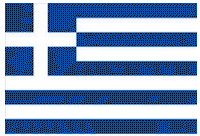
Greece is well known for its healthy Mediterranean cuisine, excellent Greek wines and great hospitality (φιλοξενία). Hellas is gifted by nature with beautiful islands, blue waters and has the 11th longest coastline in the world to enjoy the beautiful beaches, sailing, scuba diving and parasailing. At the same time Greece’s breathtaking landscape, of which eighty percent consists of mountains, makes it ideal for climbing, hiking or snow skiing. Greece is a place where one can relax, experience adventure or celebrate till morning. There is plenty to do! Most people speak English so getting around is not a problem. You will need an international driving permit if you’re planning to rent a car, which can be easily obtained from AAA or online using your driver’s license.
Hellenic history, recorded in Greek [ellinika’] over thousands of years has been written and translated in many languages throughout the world. Over fifty thousand words in the English language are derived from Greek. The New Testament is written in Greek and has since been translated into many languages. People of all nationalities feel a special bond/agape with
While visiting Hellas you will walk in the footsteps of Saint Paul the Apostle, Aristotle, Plato, Socrates, Pericles, Homer (the author of the Iliad and Odyssey) and many others. You can find hundreds of museums, ancient monasteries (Meteora, Mt. Athos, etc.) and archaeological sites.
For example, one might learn about the Battles of Marathon, Thermopylae (where 300 Spartans fought to the last man for what they believed against the Persian Empire) or Salamis (the naval encounter that saved
Following the fall of the Byzantine Empire in 1453 to the Ottoman Empire, most of Greece came under Ottoman rule for almost 400 years. During this time, there were frequent revolts by Greeks attempting to gain independence.The Greek War of Independence, also known as the Greek Revolution (Greek: Ελληνική Επανάσταση, Elliniki Epanastasi) was a successful war of independence waged by the Greek revolutionaries between 1821 and 1832, with later assistance from several European powers: Russia, United Kingdom and France created the first Hellenic Republic
Even during World War II, despite the odds, the courageous Greek nation stood up to Mussolini and Hitler. In the Island of Crete alone, German paratroopers encountered stiff resistance and incurred twice as many casualties as Cretans. Furthermore, the brave men and women of
There are many museums in Athens that are within close proximity to one another. Some of these Greek museums include the Athens War Museum, the National Art Gallery, the Byzantine and Christian Museum (which holds some of the most important Byzantine art in the world), the Cycladic Art Museum, Benaki Museum, National Archaeological Museum, the Numismatic Museum, the National Historical Museum and of course the new Acropolis Museum. Also the Archaeological Museum in Delphi in lower central
There are about as many Greeks residing outside the country (Diaspora) as there are in
What unites Greeks is their love for the Motherland, its history, religion and traditions that go back centuries.
List of Famous Greek-Americans:
Jennifer Aniston
Betty White
Anthony Thomopoulos
Stefanos Sitaras
Zach Galifianakis
Stratton Leopold
For a list of Greek-Americans,
click here
For more information about
Greek- Americans, click here
For a list of Greek-Australians,
click here
For a list of Greek-Canadians,
click here
The striped pattern was chosen because of its similarity with the wavy sea that surrounds the shores of

